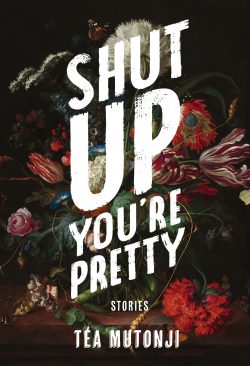#722 A punchy and brilliant debut
Shut Up You’re Pretty
by Téa Mutonji
Vancouver: VS. Books, an imprint of Arsenal Pulp Press, 2019
$17.95 / 9781551527550
Reviewed by Jenna Butler
*
 Téa Mutonji’s 2019 short story collection Shut Up You’re Pretty is the first book to be released under Arsenal Pulp Press’s VS. Books, a new imprint publishing work by young writers who are Indigenous, black, or people of colour. It’s a brilliant, punchy text with which to open the imprint. It’s also Mutonji’s first book, although she’s published prose, poetry, and essays in the likes of Joyland Magazine, The Puritan, Minola Review, Train Poetry Journal, and Feel Ways: An Anthology of Scarborough Writing. With a powerhouse debut like this behind her, I can’t wait to see what she’s got coming out next.
Téa Mutonji’s 2019 short story collection Shut Up You’re Pretty is the first book to be released under Arsenal Pulp Press’s VS. Books, a new imprint publishing work by young writers who are Indigenous, black, or people of colour. It’s a brilliant, punchy text with which to open the imprint. It’s also Mutonji’s first book, although she’s published prose, poetry, and essays in the likes of Joyland Magazine, The Puritan, Minola Review, Train Poetry Journal, and Feel Ways: An Anthology of Scarborough Writing. With a powerhouse debut like this behind her, I can’t wait to see what she’s got coming out next.
Shut Up You’re Pretty caught my attention right from the title, which reads less like a whispered reassurance and more like a stated certainty. This same certainty is something I came to expect from Mutonji over the course of the book; her narrator, Loli, grows from an uncertain girl into a striking young woman fully cognizant of the conflicting roles and expectations placed upon black women. Like her narrator, Mutonji grew up in Scarborough’s Galloway neighbourhood and writes its community in precise strokes; like Loli, too, she is Congolese and arrived in Canada at a young age. Establishing Loli as a focal narrator who moves between the stories allows Mutonji to write deeply and empathetically into this one young woman’s experiences across multiple time periods as she grows up.

With the preternatural insight of a young person who has been on the outskirts of social occasions for most of her life, either for reasons of beauty, gender identity, or race, Loli strives from story to story to read a world that has too often coded her out. Even as a child, her weariness is palpable: “There’s a moment in conversations when the light goes on and hovers on one person. Centre stage. Fixated. Muted with too many words, I froze. Not entirely sure where the anger came from. Though I didn’t feel rage. I was just tired. I was just annoyed” (p. 29). Caught at the near edge of adulthood, Loli tries to parse her parents’ relationship at the same time that she attempts to figure out how she fits into her community and how she identifies within her own body. It’s a lot to hold, and Mutonji neatly captures this sense of being, at times, overwhelmed.
Although there are moments in the book that gesture toward humour, even they are often underpinned by a slant of brutality: Loli and Jolie, her best friend growing up, decide to flash their breasts to men in return for cigarettes and think this makes them real women; Loli’s friend Tiffani asks to be hit during a drinking binge because she hasn’t had to face trauma before in her life. As Loli grows up, she becomes increasingly frustrated and resigned to a world that inevitably lets her down for being too beautiful, too caring, too black:
He said more. It’s not you, it’s me — well, it’s a little bit you, but it’s mostly me. I’m just not attracted to black women. But you, you were different. You were hurt, and you’re like family. And, I don’t know, you needed me, and I guess it was fun, at first, but then it got too real. And it’s not that I don’t love you, you must know, you’re really such a lovable person. And, and, and (p. 74).

Through Loli’s precise, poetic observations, Mutonji explores what it means to grow up in a society that promises you the world for being beautiful, then releases itself from its promises over and over because you are beautiful and black and queer. Loli’s anger and frustration are palpable as she seeks to be good enough if she cannot be loved, and at least safe if she cannot be good enough:
I don’t know why I stayed. And I certainly don’t know why I kept going back. Perhaps because I was so used to being there. So used to being that person. I could barely imagine it any other way. I was always the whore. I was always the mistress. I was always the one they reached for when they needed a drink. And maybe, after many years of this, I was ready to accept it (p. 124).
Mutonji has been very careful, in her CBC interviews and elsewhere, to point out that she is not in any way trying to universalize the black female experience, and Shut Up You’re Pretty handles this well. By having one narrator who speaks at length about her life and also encounters multiple other women from different backgrounds, Mutonji allows her readers to connect deeply to Loli without believing that hers is the black female experience or the immigrant experience. Instead, we connect with Loli as someone we’ve become invested in who also speaks a lived experience that many of us recognize.
Taut, empathetic, skilled, and wise, Téa Mutonji’s Shut Up You’re Pretty pulls no punches. Alive with moments of humour that attest to a powerful resilience, it’s a book that asks readers to listen with the same attention that young Loli pays to the adults in her life as she’s trying to establish her place in the world. As a woman of colour myself, I feel as though I’ve been waiting for Mutonji’s talented, fearless writing for a long time.

*

Jenna Butler is the author of three critically acclaimed books of poetry, Aphelion; (NeWest, 2010); Wells (University of Alberta Press, 2012), Seldom Seen Road, (NeWest, 2013); an award-winning collection of ecological essays, A Profession of Hope: Farming on the Edge the of Grizzly Trail (Wolsak & Wynn, 2015); and a travelogue, Magnetic North: Sea Voyage to Svalbard (University of Alberta Press, 2018). Her research into endangered environments has taken her from America’s Deep South to Ireland’s Ring of Kerry, and from Tenerife to the Arctic Circle, exploring the ways in which we impact the landscapes we call home. Butler is a professor of creative writing and environmental literature at Red Deer College and lives with three resident moose and a den of coyotes on an off-grid organic farm in Alberta’s North Country.
*
The Ormsby Review. More Books. More Reviews. More Often.
Publisher and Editor: Richard Mackie
The Ormsby Review is a journal service for serious coverage of B.C. books and authors, hosted by Simon Fraser University. The Advisory Board consists of Jean Barman, Robin Fisher, Cole Harris, Wade Davis, Hugh Johnston, Patricia Roy, David Stouck, and Graeme Wynn. Scholarly Patron: SFU Graduate Liberal Studies. Honorary Patron: Yosef Wosk. Provincial Government Patron since September 2018: Creative BC
“Only connect.” – E.M. Forster
